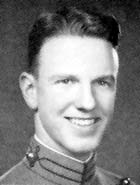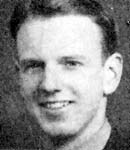Courtesy of His Classmates
United States Military Academy Class Of 1943
Francis Hamilton Bonham
No. 13099 • 6 November 1921 – 18 December 1945
Died in air crash near Cedar Keyes, Florida, aged 24 years
Interment: Arlington National Cemetery, Arlington, Virginia

Francis Hamilton Bonham was born on 6 November 1921 at Walter Reed General Hospital, Washington, DC. He was the son of a distinguished soldier and gentleman, the late Major Francis Graves Bonham (Class of 20 April 1917), and Louise Walker Bonham. His grandfather, 2nd Lieutenant William Butler Bonham, fought with the 29th Infantry, United States Volunteers, in the Spanish-American War and received a battlefield commission and the Silver Star for his gallantry during combat on Luzon, Philippine Islands. His great-grandfather, Milledge L. Bonham, was a general in the Confederate Army and later Governor of South Carolina. His great-great uncle, James Butler Bonham, was one of the four famous leaders of the Alamo garrison massacred by General Santa Anna’s Mexican Army in 1836.
“Ham” as an “Army brat,” found his preliminary schooling in many places — grammar school in Gordonsville, Virginia; Sparrows Point, Maryland; Columbus, Georgia; Fort Leavenworth, Kansas; Fort Benning, Georgia; Gordon Junior High School and Western High School in Washington, DC — and his preparation for West Point at Millard’s Preparatory School in Washington, DC.
Throughout the time prior to his entering the Military Academy, he had prepared himself physically, mentally, and morally for the task ahead. Taking advantage of the athletic facilities available on Army posts, and through tenacity, he developed himself into a fine all-around athlete. At Western High School, he was an outstanding tennis player. In academics, he always rated at the top of his class. The many hours spent in preparation enabled him to win a high place in the competitive examination for presidential appointments to West Point in 1939. His abstinence from smoking, drinking, and use of foul language never lapsed. His aim was to make himself worthy of wearing cadet gray, and that aim he achieved, “a sound mind in a sound body.”
On 1 July 1939, New Cadet Company 1 of Beast Barracks found in its bewildered ranks a vigorous wielder of the brass polish cloth. He was speedily dubbed “Blitz,” and the nickname stuck. Later as an officer, the manner in which he performed his duties was to lead many a wartime acquaintance to believe he had acquired the nickname from its German usage.
In “Blitz” the Military Academy had good material on which to work. During his three and a half years in the Academy, he garnered sundry honors. To prove he could do it, he won stars during his plebe year; thereafter he concentrated more on helping the “goats” of his class and those to follow. In athletics he captured his numerals in tennis and then concentrated on track; after an uphill struggle for two years, he emerged during second class year as Army’s crack miler to win from Navy in 4:21.
During yearling year he was elected class president and was an acting corporal. During second class year he was elected class vice-president and was a corporal. Absent from the Military Academy on flight training during most of his last year, he was one of those made an honorary company commander.
“Blitz” made use of his furlough to help those boys attempting to get into West Point via Millard’s Preparatory School. His work during this period is best described by the following extracts from the letter Colonel Millard sent to the Superintendent of the Military Academy in September 1941: “I am writing you in reference to one of your cadets who . . . was here in the capacity of assistant instructor in mathematics, and in charge of all discipline of the school . . . He was a former student of mine and knew the system under which I operate . . . While he was here he instilled discipline as is found in the Corps of Cadets only . . .; he also instilled respect for authority which should be found everywhere . . . His instructing in class was superior; his attitude toward the students was superior; his popularity, in spite of the disciplinary action he might have had to take, was superior. I believe that this young man is probably the best officer material that I have ever sent to West Point and also that I have ever seen while there as a cadet. The young man does not drink, has an extremely high sense of loyalty, responsibility, and he is always just. His many talks to my boys, as a class and individually, on the Corps of Cadets and its traditions, and conversations with him have proven to me that my selection could not have been better . . . .”
“Blitz” chose the Air Corps for his life’s work, perhaps partly because it was something new for him to lick and because he felt that to take the infantry would expose him to undue favors from the multitude of friends of his father. Perhaps it was because above the clouds he felt closer to God. Whatever the reasons, the Air Corps gained, and the Infantry lost.
On 19 January 1943, “Blitz” legally donned his hard-earned Second Lieutenant's bar and his silver wings. His life from that point led upward at a rapidly increasing rate.
Before his departure in November 1943 for England, he was stationed in rapid succession at Sebring, Florida; Ephrata, Washington ( where he received his promotion to First Lieutenant on 19 April); Redmond, Oregon; Walla Walla, Washington; Spokane, Washington; and Harvard, Nebraska.
From November 1943 till February 1945, “Blitz” served in the 447th Bomb Group (H), 4th Wing, 3rd Division of the 8th Air Force in operations against Germany. His assignments during this time included flight commander, assistant group operations officer, and squadron commander, and he received the Distinguished Flying Cross and the Air Medal with two clusters. He was promoted to captain in January 1944 and to major in September 1944.
During the period February to April 1945, he spent a well-earned leave in the United States. Rested and heavier, he returned to the group and was assigned as Deputy Group Commander. Though his combat missions ceased on VE Day, his promotions didn’t — he donned the silver leaves of a lieutenant colonel in June.
Cessation of hostilities in Europe brought early redeployment of the 447th Bomb Group to the United States, and “Blitz” flew from England into Bradley Field, Connecticut, on 4 July 1945. Six days later, he married Mrs. Susan Haislip Jarrell of Logan, West Virginia, in Charleston, West Virginia.
When the 447th Group demobilized after Japan’s surrender, “Blitz” was transferred to Army Air Forces Headquarters in Washington to serve as a section chief in the Officers’ Branch of the Office of Assistant Chief of Air Staff—1. While in this assignment, “Blitz” began a routine flight on 18 December via Charleston, South Carolina, to Drew Field, Tampa, Florida. Flying a C-45 in an overcast at 8000 feet on this night of a total lunar eclipse, he radioed at 7:00 P.M. that he was 30 miles northeast of Tampa. Then God took over and asserted His will, and all the efforts of this well-trained pilot were of no avail. Some time around 9:30 P.M., an observer on a small island 95 miles north of Tampa heard the drumming sound of a plane flying low, headed due east out of the Gulf of Mexico toward the mainland. Apparently, “Blitz” ran out of gas a few minutes later as he reached the mainland and attempted a crash landing on the beach. His landing was unsuccessful, and all on the plane died instantly.
And so the Lord judged “Blitz’s” work on earth completed and took him unto His kingdom. Nor could He have chosen one better prepared to meet his Maker. ’s was a soldier, keen of mind, conscientious, tenacious, a perfectionist who yet saw only the minor imperfections in his near perfect results. Always just and loyal, he was courageous and proud of his uniform and his country. Human, unselfish, thoughtful, generous, sincere, kind, and gentle, keen sense of humor never dulled; he was an idealist whose eyes looked for and expected only good in mankind and saw beauty in God’s lowliest creation. Slow to blame and quick to forgive, he had great personal charm, clean-cutness of mind and body, and warmth of friendship that moved all who came in contact with him. “Blitz” was deeply religious, humble in spirit, constantly seeking and fiding answers to his problems in the Bible, eyes ever turned to the stars.
This prayer found among his papers gives insight into what moved him:
“Let me do my work each day, and if darkened hours of despair overcome me, may I not forget the strength that comforted me in the desolation of other times. May I still remember the bright hours that found me walking over the silent hills of my childhood — dreaming on the margin of the quiet river, when a light glowed within me, and I promised my early God to have courage amid the tempests of the changing years. Spare me from bitterness and from the sharp passions of unguarded moments. May I
not forget that poverty and riches are of the spirit. Though the world knows me not, may my thoughts and actions be such as shall keep me friendly with myself. Lift my eyes from the earth, and let me not forget the use of the stars. Forbid that I should judge others lest I condemn myself. Let me not follow the clamor of the world — but calmly in my path. Give me a few friends who will love me for what I am, and keep ever burning before my vagrant steps the friendly light of hope. Though age and infirmity overtake me, and I come not within sight of the castle of my dreams — teach me yet to be thankful for my life — for the memories that are good — and sweet — and may the evening’s twilight find me gentle, still.”
A corner of our hearts and our thoughts will always belong to “Blitz.” We are better for having known him, and his influence remains with us. His work on earth was done, so he has gone ahead to smooth the way for those of us who “follow close order behind.” And, as a classmate one said of him, “There goes a man!”
Michael Robert Patterson was born in Arlington and is the son of a former officer of the US Army. So it was no wonder that sooner or later his interests drew him to American history and especially to American military history. Many of his articles can be found on renowned portals like the New York Times, Washingtonpost or Wikipedia.
Reviewed by: Michael Howard

